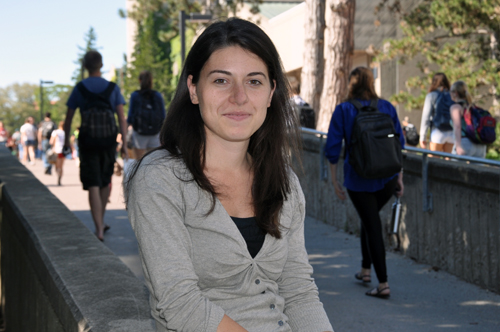
With Canada’s October unemployment rate at 7.4 per cent, one of the best things that job seekers can do is go back to school and upgrade their skills, according to research by Diana Alessandrini, a PhD student in the Department of Economics and Finance. When the economy slows down, “it’s the perfect time for people to invest in their human capital,” she says.
Human capital accumulation refers to gaining knowledge, skills and abilities that can be applied in the workplace and that can generate economic value. People with more human capital also tend to be in greater demand by employers.
As part of her PhD research, Alessandrini used the real business cycle model, which allows her to simulate economic “shocks” and observe how “agents” (individuals) respond. Previous models have used only one type of agent to represent society as a whole. More recently, economists have introduced a greater diversity of agents into their models for a more realistic representation of society.
“In reality, there are different people and they have different characteristics, so they might react to the shock in a different way based on their characteristics,” says Alessandrini. “Instead of having one agent that represents the whole society, I have one agent to represent each age and ability type.” She looked at two factors: age and productivity in learning. Her model consists of agents between the ages of 20 and 80 with high or low levels of productivity in learning.
“High types” have a greater ability to learn; “low types” are less capable of learning. “These high types can accumulate more skills and more knowledge,” says Alessandrini.
When she introduced a shock to the model economy, she observed people’s reactions based on their age and their ability to learn. During an economic downturn, fewer jobs are available and they tend to be lower paying. If people can’t find work, they are more likely to go back to school to upgrade their skills.
In this context, “the cost of education” doesn’t refer to tuition but missed employment opportunities. When the economy slows down, job seekers are better off going back to school or staying in school because they aren’t missing out on getting a well-paying job.
“If there is a crisis,” says Alessandrini, “those alternatives are less attractive because there are less jobs and lower wages, so this provides an incentive to people to go back to school or stay in school longer. The crisis provides them with an incentive to accumulate the skills and knowledge they wouldn’t have acquired otherwise.”
Young people and low-ability individuals often have a harder time finding jobs and are more likely to invest in education during an economic downturn. By doing so, they accumulate more human capital, which makes them more employable when the job market improves.
Even though incomes tend to decline during tough economic times, making post-secondary education less affordable, Alessandrini says that financial aid, scholarships and bursaries help students pursue an education that will improve their own incomes in the long run. This is especially true for developed countries, where students can receive financial support from governments and universities.
Alessandrini was inspired to study the relationship between economic conditions and education during the financial crisis of 2008. When she started her PhD in 2009, she noticed that a number of her classmates with master’s degrees had difficulty finding jobs, so they decided to stay in school. She says her own department has experienced an influx in graduate applications.
Alessandrini presented her research in Germany at the European Association of Labour Economists Conference in September.